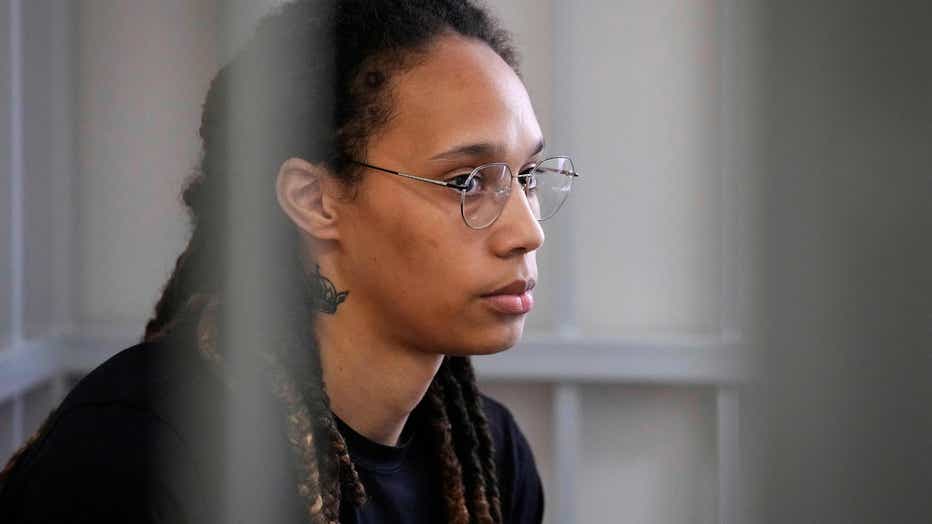US basketball star Brittney Griner testifies that poor translation led to her arrest in Russia
Watch: Phoenix Mercury's Brittney Griner detained in Russia after vapes found in luggage
Phoenix Mercury player and WNBA All-Star Brittney Griner has been jailed in Russia after vape cartridges were found in her luggage at a Moscow airport, according to multiple reports. A Russian news agency reported that Griner could spend 5 to 10 years in prison on drug smuggling charges, according to the New York Post. Credit: Federal Customs Service of Russia via Storyful
KHIMKI, Russia - American basketball star Brittney Griner testified at her drug possession trial in Russia that an interpreter translated only a fraction of what was said during questioning when she was detained at Moscow’s airport in February and that officials told her to sign documents without explaining what they said.
In her first testimony in the trial under questioning from the prosecution, Griner also said that besides the poor translation at the airport, she received neither an explanation of her rights nor access to a lawyer during the initial hours of her detention. She said she used a translation app on her phone to get the basic idea of what she was told.
Griner has been held since mid-February after police said they found vape cartridges containing cannabis oil in her luggage. She has pleaded guilty to the charges but says she had no criminal intent in bringing them into the country and packed in haste for her return to play in a Russian basketball league during the WNBA’s offseason.
Her arrest came at a time of heightened tensions between Moscow and Washington ahead of Russia sending troops into Ukraine later that month. The slow-moving trial and Griner’s five months of detention have raised strong criticism among teammates and supporters in the United States, which has formally declared her to be "wrongfully detained" — a designation sharply rejected by Russian officials.
Griner, 31, faces up to 10 years in prison if convicted. Trials in Russia proceed even after a guilty plea, and there has been speculation that her admission was a bid to move the legal process along in hopes of a possible prisoner swap.
MORE: Brittney Griner: WNBA star's Russian trial considers medicinal use of cannabis
At the start of Wednesday’s session, Griner’s lawyers asked that she be allowed to testify outside the cage that is standard for defendants in Russian courts, arguing it was too small for the 6-foot-9 (206-centimeter) athlete to testify while standing. The judge denied the request but allowed her to speak while seated.
During her testimony, the Phoenix Mercury standout and two-time Olympic gold medalist described making a grueling 13-hour flight to Moscow from Arizona while recovering from COVID-19. Griner said she still does not know how the cannabis oil ended up in her luggage but explained she had a doctor’s recommendation for using it to address chronic pain.
She recalled getting pulled aside at the airport on Feb. 17 after inspectors found the cartridges.
Along with the interpreter who provided an incomplete translation, Griner said she received neither an explanation of her rights nor access to a lawyer and was instructed to sign documents without explaining what they said.
After hours of proceedings she did not understand, she was allowed to hand over her personal belongings to a lawyer before being led away in handcuffs, Griner said. She said she received only a cursory translation of the allegations during a Feb. 19 hearing where a court sanctioned her arrest.
Griner’s lawyer, Maria Blagovolina, told reporters after Wednesday’s session that Griner "repeatedly underlined that she had no intention to bring the forbidden substances into Russia."
The next trial session was set for Aug. 2. Griner’s trial began July 1 in the Moscow suburb of Khimki where Sheremetyevo Airport is located, and it is unclear how long it will last. The court has held five previous sessions that were short, and her detention has been authorized until Dec. 20.
MORE: Arizona Sens. Mark Kelly, Kyrsten Sinema call for immediate release of Brittney Griner
On Tuesday, a Russian neuropsychologist testified about global use of medicinal cannabis, which is illegal in Russia. Griner’s defense team has submitted to the court a U.S. doctor’s letter recommending she use cannabis for pain.
Griner said Wednesday she used medicinal cannabis for relief from pain due to injuries sustained during her career, adding that it is widely used in the U.S. because it has fewer negative effects than some other painkillers.
A Russian Foreign Ministry spokesperson said last week that the legalization of cannabis for medical and recreational use in parts of the U.S. had no bearing on what happens in Russia.
Elizabeth Rood, the U.S. Embassy’s charge d’affaires who has been attending the trial, said Griner was feeling well.
"We are going to continue to monitor the case of Ms. Griner very closely, as well as the case of all U.S. citizens detained or in prison in Russia," she said.
Some of Griner’s supporters contend she is being held in Russia as a pawn, possibly for a prisoner swap. American soccer notable Megan Rapinoe last week said "she’s being held as a political prisoner, obviously."
MORE: LeBron James critical on his show of US efforts to get Brittney Griner home
Russian media have speculated that Griner could be exchanged for prominent Russian arms trader Viktor Bout, who is imprisoned in the United States, and that Paul Whelan, an American imprisoned in Russia for espionage, may also figure in an exchange.
U.S. officials have not commented on the prospects for such a trade. Russian officials have said no exchange could be discussed until the conclusion of the legal proceedings against Griner.

US WNBA basketball superstar Brittney Griner sits inside a defendants' cage before a hearing at the Khimki Court, outside Moscow on July 27, 2022. - Griner, a two-time Olympic gold medallist and WNBA champion, was detained at Moscow airport in Februa

